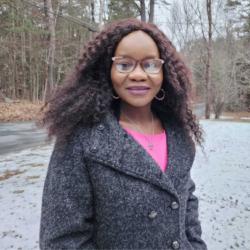Jean Kayira served as a core Antioch faculty member for more than 10 years and is currently associate faculty at SUNY-ESF and affiliate faculty at AUNE. She continues to collaborate with Antioch faculty member Dr. Libby McCann and environmental education students through externally funded initiatives, mentors Antioch doctoral students, and serves on Community Garden Connections’ Advisory Committee. Her areas of interest include sustainability education, Indigenous knowledge systems, and postcolonial theory; youth, place, and culture; decolonizing and Indigenous research methodologies; participatory forms of education and research; and cross-cultural education and research. She teaches courses such as Indigenous Research Methods and Program Evaluation. Jean is engaged in a variety of research projects, working with youth and teacher candidates on issues of community engagement, particularly examining Indigenous knowledge and sustainability, youth identity in relation to place and sustainability, and social and ecological justice pedagogies. Through her doctoral research, Jean explored the possibilities of Indigenous knowledge in furthering student learning in relation to culturally appropriate environmental sustainability. She has drawn on the sub-Saharan African concept of Ubuntu/uMunthu and postcolonial theory to enable a third space (Bhabha, 1994) centered on culturally appropriate Malawian ways of knowing, while at the same time, working in tandem with non-Indigenous knowledge and practice. In broad terms, this study sought to widen the space that meaningfully acknowledges both Indigenous and non-Indigenous knowledge and practice.
- PhD, Environment and Sustainability, University of Saskatchewan, Canada, 2013
- MA, Environmental Science & Policy, Clark University, Worcester, MA, USA, 2004
- BEd, Science, University of Malawi – Chancellor College, Malawi, 1991
Indigenous knowledge systems, food sovereignty, decolonizing and Indigenous research methodologies, community-based research, youth participatory action research, climate change education, and culturally responsive & equitable evaluation
- Kayira, J., Lobdell, S., Hertz, S., Healey, J., McHone, E. Gagnon, N., Schuttenberg, E. (2022). Responsibilities to Decolonize Environmental Education: A Co-Learning Journey for Graduate Students and Instructors. Societies, 12(4), 96, DOI: 10.3390/soc12040096
- Datta, R., Kayira, J., & Datta. P. (2022). Land-based environmental education as a climate change resilience: A learning experience from a cross-cultural community garden. In E. Walsh (Ed.), Equity and social justice in climate change education: Exploring social and ethical dimensions of environmental education, pp. 214-233. Routledge.
- Marshall. A.A., Kayira, J., Tegegne, Y.T., Gruber, J. (2020). A Comparative analysis of the institutional capacity of FLEGT VPA in Cameroon, Central African Republic, Ghana, Liberia, and the Republic of the Congo. Forest Policy and Economics. 112, DOI: 10.1016/j.forpol.2020.102108
- Marshall. A.A., Kayira, J., Gruber, J., Idemudia, U., Tegegne, Y.T., Attah, A.N. (2020). Good governance practices in Ghana’s FLEGT voluntary partnership agreement process: An application of Q methodology. Journal of Environmental Policy & Planning, 23 (1), 1-15, DOI: 10.1080/1523908X.2020.1784116
- McVittie, J., Datta, R., Kayira, J., & Anderson, V. (2019). Relationality and decolonisation in children and youth garden spaces. Australian Journal of Environmental Education, 35 (2), 93-109. doi:10.1017/aee.2019.7
- Tuokuu. F.X.D., Idemudia, U., Gruber, J., & Kayira, J. (2019). Linking stakeholder perspectives for environmental policy development and implementation in Ghana’s gold mining sector: Insights from a Q-methodology study. Policy. 97, 106-115, DOI: 10.1016/j.envsci.2019.03.015.
- Tuokuu. F.X.D., Idemudia, U., Gruber, J., & Kayira, J. (2019). Identifying and clarifying environmental policy best practices for the mining industry—A systematic review. Journal of Cleaner Production. 22, 922-933, DOI: 10.1016/j.jclepro.2019.03.111
- Kayira, J. (2018). Exploring hybrid third spaces in the place mappings of Malawian youth. Southern African Journal of Environmental Education, 34, 30-47, DOI 10.4314/sajee.v34i1.3
- Tuokuu. F.X.D., Gruber, J., Idemudia, U., & Kayira, J. (2018). Challenges and opportunities of environmental policy implementation: Empirical evidence from Ghana's gold mining sector. Resources Policy. 59, 435-445, DOI: 10.1016/j.resourpol.2018.08.014
- Anderson, A., Datta, R., Dyck, S., Kayira, J., & McVittie, J. (2016). Meanings of culture in sustainability education research. Journal of Environmental Education, 47(1), 1-18, DOI: 10.1080/00958964.2015.1056077
- Anderson, A., McKenzie, M., Allen, S., Hill, T., McLean, S., Kayira, J., Knorr, M., Stone, J., Murphy, J., & Butcher, K. (2015). Participatory action research as pedagogy: Investigating social and ecological justice learning within a teacher education program. Teaching Education. 26 (2), 179-195, DOI: 10.1080/10476210.2014.996740
- Kayira, J. (2013). (Re)creating spaces for uMunthu: Postcolonial theory and environmental education in Southern Africa. Environmental Education Research 21 (1), 106-128. DOI: 10.1080/13504622.2013.860428
- McKenzie, M., Butcher, K., Fruson, D., Knorr, M., Stone, J., Allan, S., Hill, T., Murphy, J.,McLean, S., Anderson, V., & Kayira, J. (2013). Suited: Relational methodologies and critical eco pedagogies. In M. Brody, J. Dillon, R. B. Stevenson & A. E. J. Wals (Eds), International handbook for research on environmental education. Routledge.
- American Educational Research Association (AERA), 2010 - present
- New Hampshire Environmental Educators (NHEE), 2014 - present
- North American Association for Environmental Education (NAAEE), 2013 – present
- Daughters of Toleza Scholarship Fund, 2016 – present
- Keene YMCA Social Justice Committee, 2020 - 2023

